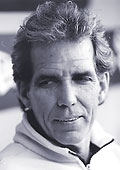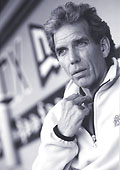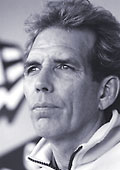 |
 |
|||||
 |
 |
 |
 |
 |
||||||||||
 |
 |
 |
||||||||
| Ed Farmer: “I’m not a pious guy that’s saying a breviary every
day. In my own way, I try not to walk too fast that things go
unseen.” Catholic New World photos by David V. Kamba
White Sox broadcaster lives home-grown faith
In 1980, South Side native Ed Farmer saved 30 games for the Chicago
White Sox and was a major league All Star. Ten years later, he
had a kidney transplant. Now, after working as a baseball scout,
he is one of the radio voices of the White Sox. Through it all,
Farmer has stayed true to the faith developed at St. Thomas More
School and St. Rita High School. Ed Farmer: I went to Catholic grade school and Catholic high school. Not all my brothers and sisters got that opportunity, but the beliefs are all the same within my family. My father and my mother were adamant about us attending Mass on
Sundays and holy days. Everyone in our neighborhood—St. Thomas
More—which is where St. Rita is now—they were adamant about us
going, and about different things in the religion. It isn’t that
much to ask, to abstain from certain things during Lent and on
Ash Wednesday and Good Friday. Basically, I have never changed.
I have gone to Mass when I’m supposed to, and occasionally I go
in to say prayers for people. The list of prayers is getting longer
the older I get. Some people are leaving me, and I’m saying prayers
that they’re getting to heaven. EF: No, not really. When I was pitching here, I would say, “This
is for you. It isn’t for me. I want to be as good as I can. I
offer this game for you.” I would say that, but nobody would know
that. I’ve not told anybody that. And that’s how I pitched. Going
to St. Rita High School, the priests were on us pretty hard. The
Augustinians were excellent teachers. I know the Jesuits are great
teachers; the Augustinians have got to be right there with them.
It’s been my way of life. I don’t take it for granted. EF: I’ll say Happy Easter or on Good Friday, I’ll say, “Remember that it’s one meal today and no meat.” It’s not that I’m trying to browbeat somebody. It’s just reminding people because I’ve probably forgotten something along the way, and somebody’s reminded me, and that’s been good. I don’t make a big thing out of it. And I don’t hound—I just throw
it out there, so it’s out there for a second in the air, and then
it’s gone. So if they’ve heard it and can use it, that’s good.
But I never think, “Well, jeez, I hope I’m touching these people.”
EF: I had the transplant 11 years ago. I had faith that I was going to come through it OK. My brother Tom gave me one of his kidneys. If it wasn’t for him, I wouldn’t be alive today. I had polycystic kidney disease. It’s a hereditary disease, genetically transferred, and in your 40s or in your 30s, in my case, it starts to knock down your immune system, and all of the sudden you can’t do anything. You become tired, and your muscles go. I had faith in God; I had faith in my wife and daughter, too, to pull me through. My brother Tom came up huge. I’m not a pious guy that’s saying a breviary every day. In my own way, I try not to walk too fast that things go unseen. I never thought I had it made, even when I was here setting records
with the Sox. Life is so short—since I’ve had the transplant I
just live for today, and then tomorrow comes along. I think everybody
out here’s had a certain amount of gift they got from the Almighty,
and I was touched with a certain amount of talent. It’s what we
do with it—good and bad. EF: I was pitching in the Dominican Republic, and I was about to get released. That’s like going to kindergarten, and having them tell you that you’re going to fail. You’re down there to work on things, so you really had to be pitching bad or playing bad (to get released). It was my first year and half out after arm surgery. The money that I was making in winter baseball was going to carry us through the winter, so I was going to be out of a job and we were going to have to live on savings. I remember turning to my wife, and I said, “Look, when you say your prayers tonight, tell God that my light switch is open, and I’m not getting this.” So the next day, I go to the ballpark, and I’m throwing, just warming up on the side, getting my work in. I started throwing a curve ball that I threw in high school. I hadn’t thrown this curve ball in six years of professional baseball, and all the sudden, I’m throwing it, and the bottom just fell out of it. The catcher said to me, “Where’ve you been hiding this?” I said, “I don’t know.” I didn’t tell him the story about talking to my wife the night before. He said, “You need to use this pitch in a game.” I started throwing the curveball in a game two nights later and I struck out 10 and threw a three-hitter, and all of the sudden, my fastball came back. My next start, I struck out a dozen. The next start I struck out 15, and I was off and running for then on. That was 1978. I came here and set the record for saves the year after that, after being traded. That year that I got here, out of the bullpen, I was real good. The next year, I was even better. But when I look back on what I did then, it was like somebody else did that stuff. I never make a big deal out of it. I got a ring for the World Series in Philadelphia and an All-Star ring, but I never wear them. My wedding ring is the only piece of jewelry I wear, that and this cross that my wife gave me. On this cross—Digger Phelps, who coached the University of Notre Dame basketball team, was a real good friend of mine. He came to see me before the transplant, and I was looking real bad. You don’t care if you die. Life isn’t like it used to be. Digger Phelps had just come from Medjugorge. He gave me this medal that clipped on to this cross right here, and he said, “When you’re healed, this medal will fall off, and the Blessed Virgin’s picture which is inside will fade away.” I’m like, OK, I’ll buy into that. So I put it on—I didn’t think anything of it. I get the transplant from my brother, and about three months later, I feel this thing in the bottom of my shirt. So I pull my shirt out, and it’s the medal. It had fallen off, and it had turned color on the back, the picture of Our Blessed Lady inside had faded. I don’t tell that story. Front Page | Digest | Cardinal | Interview |
||||||||||